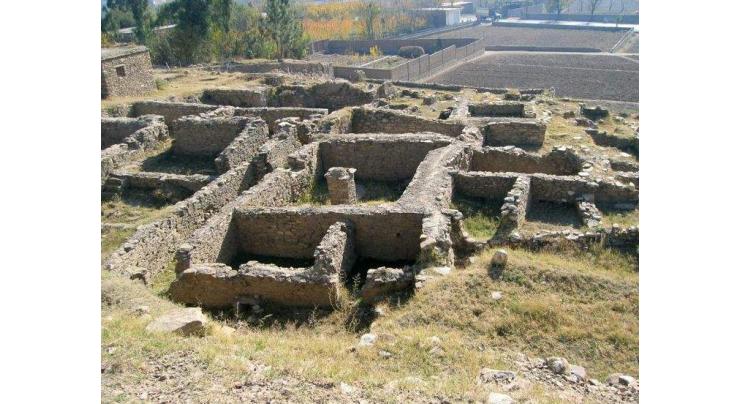
Archeologists From USA, UK, France, Spain, Japan And Italy Readout Research Papers
Umer Jamshaid Published February 10, 2017 | 06:05 PM

MOHENJODARO, (UrduPoint / Pakistan Point News - 10th Feb, 2017 ) - Renowned archeologists from the U.S.A, UK, France, Spain, Japan and Italy, who are currently attending the 3-day International conference on Mohen Jo Daro & the Indus valley civilization, being held at the ancient site of Mohenjodaro, on Friday, readout research papers on technical aspects dealing with the research and excavation carried out hitherto; measures undertaken to protect and preserve the site for posterity; mid-term plans for the site preservation; promotion of tourism; signs of the Indus script discovered so far; seals carving techniques and other related issues.
Archeologist from Japan Dr. Ayumu Konasukawa, who has obtained his Ph.D. from the Department of Archeology at the Deccan College Postgraduate and Research Institute (Pune, India), readout his paper on the subject of Chronological change & continuity of Seal Carving Techniques from the Early Harappan to the Haprappan periods in the Ghagar Basin.
Another scholar from the same country, Dr. Atsushi Noguchi readout his paper on Development of Lithic Technological System & Socio-Economic integration Through the Early Harappan Period: The key Role of the Northern Sindh & Mohenjodaro.
Dr. Rita Patricia Wright, archeologist from the United States of America, who is a Senior Lecturer on Anthropology, Harvard University, readout his research papers on the subject of, "Enigmatic polities and the Indus Civilization".
French Scholar Ms. Sophia Merry, who is currently the Director of French Archeological Mission to the UAE excavated sites in Abu Dhabi, could not come to attend the conference, however, her research paper on the subject of "Beyond the trade: the potters of Meluhha (Pakistan) as vectors of the diffusion to Magan( Eastern Arabia) of a technological and material culture during the Indus Period".
The expert termed the Sindh Government's decision to convene International Conference on Mohenjodaro and the Indus Valley Civilization, as a need of hour and expressed their optimism that recommendations finalized by the conference would be implemented with strong commitment and determination.
An Associate Professor of Anthropology and urban studies at the Pratt Institute of Art and Design in the US Dr.
Uzma Rizvi, presented her paper on "Early Urban Forms: Architecture, Infrastructure and Access at Mohenjo Daro".
Dr. Uzma Rizvi spoke of ratios and how Mohenjodaro was built on ratios; from the homes to the streets to the bricks, everything was built in using standardized measurements and ratios. If an ancient person was walking through the city, then they were walking through a ratio, Dr.
Rizvi said. In her work, she explored the implications of bricks, both mud and fire bricks, and the philosophical impact of standardization on the Indus cities' inhabitants. "These bricks are literally the building blocks of the civilization," she explained.
She said the bricks are also the foundation of techno-politics in the Indus civilization. Proportionality is closely linked to the people, she said, adding that �the Indus body is linked to the Indus brick�.
She also briefly discussed the urban concepts of waste management and drainage systems in Mohenjodaro. The basic premise of Dr Rizvi's paper was the concept of identity and how the urban structure of the city influenced the peoples' identity.
Identity is comprised of different aspects and we want to discover what the components were of the people of the Indus civilization, she told participants. She said that, we are also exploring the concept of centralized power, which has left traces on the projected movement of the people.
Former Sindh Minister for Culture Senator Sassui Paleejo in her presidential address of one session said that before 18th constitutional amendment, the Federal government did not pay required attention to the archeological sites, adding that in the wake of devolution of powers, the provincial governments would be taking concrete measures to protect and preserve the world heritage for the posterity.
The participants were informed on some projects and initiatives launched by the government of Sindh in order to protect the site from the onslaughts of flood, water logging and salinity with the help of satellite images. APP/msb/msk/rn
Related Topics
Recent Stories

3 Gawadar attack victims funeral offered

Mbappe says he will leave PSG at end of season

Usmani felicitates Sardar Saleem on taking oath as Punjab Governor

DC for provision of facilities to people in Lasbela

Solar storm could bring auroras, power and telecoms disruptions

Court grants interim bail to PTI leaders

Ulema, Mashaykh call for political accountability, collaboration for Pakistan's ..

SHRC asks NADRA to issue CNICs to transgender as per law

Flash floods kill 50 in one day in north Afghanistan

CDA chief expresses commitment to promoting modern-day technologies

By wide margin, UN General Assembly votes to back Palestinian bid for membership ..

Musadik slams PTI's political approach as provocative
More Stories From Pakistan
-
LHC stops govt from distributing bikes among students till May 13
4 hours ago -
ECP refutes false reports on reserve seats reaction
5 hours ago -

3 Gawadar attack victims funeral offered
5 hours ago -

Usmani felicitates Sardar Saleem on taking oath as Punjab Governor
5 hours ago -

DC for provision of facilities to people in Lasbela
5 hours ago -

Court grants interim bail to PTI leaders
6 hours ago
-

Ulema, Mashaykh call for political accountability, collaboration for Pakistan's stability
6 hours ago -

SHRC asks NADRA to issue CNICs to transgender as per law
6 hours ago -

CDA chief expresses commitment to promoting modern-day technologies
5 hours ago -

Musadik slams PTI's political approach as provocative
5 hours ago -

Saudi Arabia to test flying taxis, drones this Hajj season: Minister
5 hours ago -

Governor for making comprehensive policy to protect universities from financial crisis
5 hours ago









